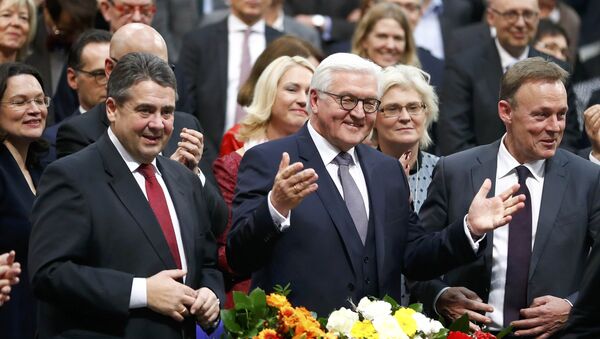Steinmeier, a Social Democratic party (SPD) politician, received the backing of German Chancellor Angela Merkel of the Christian Democratic Union (CDU). The CDU and its Bavarian sister party the Christian Social Union (CSU) decided not to propose a Presidential candidate, instead supporting Steinmeier as a unity candidate.
"At a time when there is unrest and instability around the world, sending a signal of stability — and so the conservatives supporting Steinmeier's candidacy — is in my view right and important," Merkel said in November, explaining her decision.
Steinmeier faced competition from several smaller parties: Die Linke (The Left), Alternative for Germany (AfD), and Freie Waehler (Free Voters), which campaigns for MPs to shed their party affiliations. The satirical Die Partei (The Party) also put forward a candidate.
The Buendnis 90/Die Gruenen (Greens) party leadership backed Steinmeier, although some MPs supported other candidates.
For example, the Greens chairman in the Berlin state parliament, Antje Kapek, voted for Die Linke candidate Christoph Butterwegge. She told the Berliner Zeitung that her party should have put forward its own candidate.
"I think it was a mistake that we were not even properly presented with the individual candidates. I only know about two of the five. I think it's regrettable that they didn't present themselves at least once and said a few words about themselves. I think something needs to be changed."
Stroebele joined other high-profile German politicians such as Die Linke's Sevim Dagdelen in criticizing Steinmeier for his role in the Kurnaz affair, and his failure to apologize to Kurnaz for the length of his incarceration in the Guantanamo Bay detention center.
"I worked with Steinmeier on several committees during my time in the Bundestag. For this reason, I have doubts about whether he is the right candidate. This is especially the case with regard to the Kurnaz affair, which I dealt with extensively. I think that Mr. Steinmeier bears responsibility that this man from Bremen spent three years in Guantanamo. I'm still waiting for him to say some words of regret about it," Stroebele said.
Murat Kurnaz, a Turkish citizen and German resident who was born in Bremen, spent over four years at Guantanamo, from January 2002 to August 2006. In October 2001, the 19-year-old was detained by Pakistani security forces in Lahore, where he was studying Islam with the Tablighi Jamaat, a Sunni Islamic missionary movement.
He was handed to the US and detained as an "illegal combatant," despite no evidence that he had links to al-Qaeda or presented a threat to the US.
US investigators concluded that Kurnaz was not a terrorist, and the CIA told a European Parliament investigative committee that in 2002, the US offered to allow Kurnaz to leave Guantanamo and return to Germany, but the German government did not accept the offer.
As Germany's Federal President and head of state, Steinmeier will have a range of responsibilities. The President dismisses and appoints federal ministers proposed by the Chancellor, and appoints judges and civil servants.
The President also signs laws and dissolves the Bundestag on the order of the government. Presidents have traditionally refrained from commenting publicly on issues in the news, particularly if they are the subject of political disagreement.
Stroebele said the position of President has a useful function in German politics, although the election process requires some reform.
"The electoral procedure needs to be simplified somewhat, it doesn't do justice to the importance of the Federal President. However, I believe that this version of the Presidential office, which was introduced in Germany after the war, has proved itself in reality. The President takes a lot of meetings and does a lot of work, which would otherwise lie with the Chancellor or ministers. He can achieve things from a more neutral position," Stroebele said.
Never miss a story again — sign up to our Telegram channel and we'll keep you up to speed!





